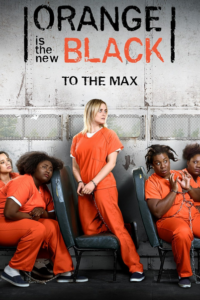The Social Mirror of Orange Is the New Black

NOTE: This article contains spoilers for Season 6 of Orange Is the New Black.
The hit show Orange Is the New Black (OITNB) returned to Netflix for a sixth season on July 27. The show follows the lives of female inmates in the fictional Litchfield Correctional Facility and grew out of the 2010 memoir of Piper Kerman, a young woman sentenced to fifteen months at a minimum-security federal prison for money laundering. Kerman is the inspiration for the series’ main character, Piper Chapman (portrayed by Taylor Schilling).
Since the show debuted in 2013 religion, spirituality, and the values that come along with any faith tradition have played a significant role in shaping the characters, and this season proves no different. In Season 1, viewers saw a former drug addict turn violently evangelical, a Catholic nun bring peace to worship groups, and a Buddhist yoga teacher lead workshops that blended strength and faith. In later seasons, Latina inmates practiced Santeria and a stereotypical redneck with an addiction to meth revealed her surprising history as a young Amish woman who got caught up in the drug culture during her Rumspringa.
In Season 6 the inequities and brutal realities of the US prison system continue to be draped in the trappings of other oppressive systems. The socioeconomic stratifications outside the barbed wire-topped walls are on display as some inmates are represented by high-powered attorneys carrying sleek laptops, and others are represented by frazzled and overstressed public defenders. The power of religion to break apart a family is exemplified by the parents of inmate Nicky Nichols (Natasha Lyonne) who made their daughter’s bat mitzvah the battleground for a nasty divorce. The American Civil Liberties Union and Black Lives Matter show up in the courtroom to defend a black inmate wrongly accused of killing a guard, and in a moment that wrenches tears from both the character and the viewer, [SPOILER ALERT] a guilty verdict rings through the courtroom. Drawing a marked connection to the immigration battles of today’s politics, the industrialized prison corporation that controls the women’s lives begins to branch out into border control and detention.
Religion and the connection to issues that affect the US population day in and day out serve to aid OITNB in one of its primary endeavors: to connect the average viewer to the emotional trials of female inmates in a new and groundbreaking way. The show has been heralded as an entirely new genre: the empathy drama. This connection to the audience in such a gripping and emotional way leads me to ask: Is caring about the plight of inmates an inherently humanistic mission?
Leveraging the social power many of us carry to enact change in a system that takes advantage of every person wrapped up within it is a noble goal. There are a growing number of humanists behind bars, and the American Humanist Association’s Appignani Humanist Legal Center is honored to support their attempts to meet regularly. Likewise, the AHA Center for Education is continuing to provide pen pal correspondence and meet the growing demand for humanist, atheist, and freethought literature to incarcerated people.
Orange Is the New Black has, for many years, done the important work of bringing prison conditions and inmate rights to the forefront of the public mind through entertainment. It’s up to those of us guided by compassion and care to turn that awareness into activism and long-lasting change.
